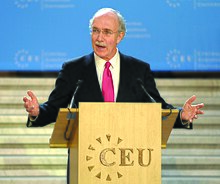John Shattuck
| John Shattuck | |
|---|---|

John Shattuck, inauguration as Central European University President and Rector. November 2, 2009
|
|
| Assistant Secretary of State for Democracy, Human Rights, and Labor | |
|
In office June 2, 1993 – November 13, 1998 |
|
| President | Bill Clinton |
| Preceded by | Patricia Diaz Dennis |
| Succeeded by | Harold Hongju Koh |
| 3rd United States Ambassador to the Czech Republic | |
|
In office October 22, 1998 – December 16, 2000 |
|
| President | Bill Clinton |
| Preceded by | Jenonne R. Walker |
| Succeeded by | Craig Roberts Stapleton |
|
President and Rector of Central European University |
|
|
In office 2009–2016 |
|
| Preceded by | Yehuda Elkana |
| Succeeded by | Michael Ignatieff |
| Personal details | |
| Born | 1943 (age 73–74) |
| Alma mater |
Yale University Yale Law School |
John Howard Francis Shattuck (born 1943) an international legal scholar and human rights leader. He served as the fourth President and Rector of Central European University (CEU) from August 2009 until July 31, 2016. He is a senior fellow at the John F. Kennedy School of Government., and he will join the faculty of Fletcher School of Law and Diplomacy in January 2017.
Shattuck received a BA from Yale College in 1965, a MA in 1967 from Clare College, Cambridge University, with First Class Honors in International Law, and a JD degree in 1970 from Yale Law School.
His first position was National Staff Counsel at the American Civil Liberties Union 1971-76; he then served from 1967 to 1984 as Executive Director of the Washington office and national staff counsel, handling a number of prominent civil rights and liberties cases, including Halperin v. Kissinger,.
From 1984 to 1993 he was appointed Vice President, Government, Community and Public Affairs, at Harvard University, and beginning in 1986 was also a Lecturer at Harvard Law School, and Senior Associate, Program on Science, Technology and Public Policy, Kennedy School of Government. From 1998 to 2000, he was US Ambassador to the Czech Republic.
From 1993 to 1998, he was United States Assistant Secretary of State for Democracy, Human Rights and Labor under President Bill Clinton, where he played a key role in the establishment by the United Nations of the International Criminal Tribunals for Rwanda and former Yugoslavia, working closely with Secretary of State Madeleine Albright. In 1995, he was the first international diplomat to reach survivors of the Srebrenica genocide in Bosnia, assembling evidence for the UN Security Council vote authorizing NATO intervention in Bosnia.
...
Wikipedia
